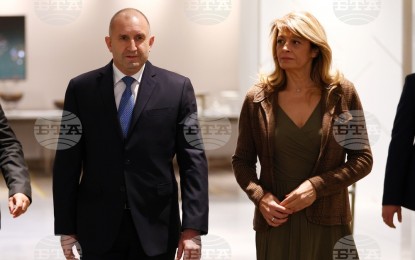
President Rumen Radev and his wife arriving for the The Economist's forum in Sofia on Feb. 7, 2024 (BTA photo)
SOFIA, Bulgaria – Bulgaria President Rumen Radev said memberhip in Schengen, the euro area and the Organisation for Economic Co-operation and Development (OECD) is above all a means to achieve the most important goal - Bulgarians to live securely and better tomorrow than today.
In his words, the most important thing is to have clarity in the goals and priorities that are set.
Recently, the political space has been busy with talk that the strategic national goals are Schengen, eurozone and OECD membership, Radev said, addressing The Economist magazine's The World Ahead 2024 forum in Sofia on Wednesday evening.
In his words, these goals cannot be achieved with meetings, but with sustainable, social and economic instruments.
The head of State noted that it is very important to have continuity in politics - where there is success it should be developed, and where there are deficits they should be filled.
"Because the global challenges will not diminish, we all know what awaits us this year - European elections, national elections in a number of countries, presidential elections in the United States, the war in Ukraine, new crises in the Middle East, the unceasing tensions in the Far East," Radev said.
"If we look at where Bulgaria stands in this dynamic landscape, we should first of all be aware of the challenges that lie ahead of us," he added.
Bulgaria is an open economy, it is part of the European and global economic space, and at a time of unprecedented economic, political and social changes in the global perspective and in a very complex security environment, Radev went on to said.
He stressed that predictability is an extremely important factor for successful business and investments. "I cannot hide my satisfaction with the growth of Bulgarian business," Radev said.
He noted that he meets with representatives of the Bulgarian business and visits various enterprises.
New and ever more innovative high-tech and high added value enterprises are being developed.
Bulgaria is becoming an increasingly industrialised country.
A green and circular economy is developing, the President added. He stressed that there is growth in corporate social responsibility and dual education.
Radev noted that Trakia Economic Zone has indeed established itself as a regional leader and a model of successful cooperation between business, local government and education.
In his words, Bulgarian business has shown that it can be flexible in a complex environment.
The President also noted the role of the caretaker government which in just 10 months in power laid some solid foundations for economic development.
"The Bulgarian economy continues to be hostage to demographics, severe regional, economic, social imbalances, lack of connectivity - within the country and with our neighbours, quality of education and lack of sufficient workforce," Radev argued.
Bulgaria still ranks second to last in the EU in terms of implementation of digitalisation and innovation in the economy and in public life, he added.
"Where do we want to see ourselves on the global and European innovation map and on Europe's investment map?" he asked, adding that we should have clear benchmarks.
He gave as examples Transparency International's Corruption Perceptions Index, the World Press Freedom Index, the conditions for doing business, the World Bank's ranking.
"Every point up or down could mean plus or minus billions of investments for Bulgaria," Radev said and asked why Bulgaria does not set a goal to enter the top 25 of these rankings.
In his words, achieving that will increase the attention and trust in Bulgaria. Institutions are the key to competitiveness and high quality of life, Radev argued further.
"They make the difference between countries when it comes to prosperity and success, because institutions can give an independent judiciary, freedom of the media, freedom of business, protection of business and property, and can make the environment for business really good and, most of all, the environment for the development of every citizen of this country to meet their goals, aspirations and opportunities," Radev said.
According to him, 2024 will be a year of adaptation of Bulgaria and the Bulgarian economy to the great geopolitical dynamics and, most of all, of exploiting Bulgaria's competitive advantages and opportunities.
In the President's words, the big task remains the talent of Bulgaria's young people. According to him, the challenge lies in how to transform this capital into an innovative economy. (BTA)
